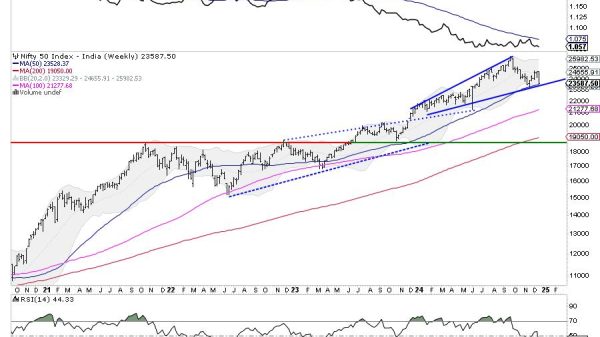HO CHI MINH CITY/BANGKOK — During the coronavirus disease 2019 (COVID-19) lockdowns in Vietnam last year, blogger Bui Van Thuan took to Facebook to criticize a government plan to use soldiers to deliver groceries to people confined to their homes in Ho Chi Minh City. Days later, he was arrested.
Mr. Thuan, 41, a former teacher in the country’s northern province of Hoa Binh, was last month sentenced to eight years in prison for propaganda, and a further five years of probation.
Vietnamese authorities charged Mr. Thuan with “making, storing, disseminating or propagandizing information, materials and products that aim to oppose” the nation — a charge that is increasingly applied to online content as the state exerts greater control over the internet, human rights groups say.
“The Vietnamese government has long been in control of traditional media in the country,” said Phil Robertson, deputy Asia chief at Human Rights Watch. “Now they are trying to control the online space.”
“They have passed a raft of legislations to that end, and are deploying the state machinery to go after people online, forcing content moderation and removal decisions on platforms, using cyber trolls and by controlling internet access,” he said.
Mr. Thuan is just the most recent target of Vietnam’s tightening grip on the internet, with authorities arresting dozens of journalists and bloggers — and even a popular noodle seller — on similar charges.
Vietnam’s authorities last month said they had tightened regulations to deal with “false” content on social media platforms — so that it must be taken down within 24 hours — making the Southeast Asian nation one of the world’s most rigorously controlled regimes for social media companies.
Yet Vietnam is not alone. Online censorship reached an all-time high in 2022, with a record number of governments blocking political, social, or religious content, according to Freedom House, a non-profit based in Washington DC.
The rising “digital repression” has serious consequences for fundamental rights including freedom of expression, access to information and privacy, “particularly for people living under authoritarian regimes,” it said in its annual report.
“In some countries, it’s about limiting the voice of political dissidents, activists and others critical of the government,” said Damar Juniarto, executive director of digital rights group Southeast Asia Freedom of Expression Network (SafeNet).
“But governments also want to control Big Tech firms — they see them as being too powerful, too influential,” he told the Thomson Reuters Foundation.
‘DRACONIAN’ TIMEFRAME
More than three-quarters of the world’s over 4.5 billion internet users live in countries where authorities punish online expression, according to Freedom House, which ranked China as having the worst environment for internet freedom.
Elsewhere in Asia, Indonesia enacted rules this year to make social media platforms remove content deemed unlawful or that “disturbs public order” within four hours if considered urgent, and 24 hours if not. Those who do not comply could face fines, criminal charges or being blocked in the country.
Its new criminal code has also tightened controls on so-called “fake news” and insulting the president online.
Vietnam’s Minister of Information and Communications Nguyen Manh Hung told parliament its new laws were needed, as there was a risk that “false news, if it is handled in a slow manner, will spread very widely.” Companies that do not meet the deadlines may have their platforms banned.
Meanwhile, Singapore last month passed an Online Safety Bill that requires social media sites to block “harmful content” within hours, failing which authorities can ask service providers to block access to that content to domestic users.
India said in October it would set up a government panel to examine user complaints about content moderation decisions by social media platforms, sparking concerns about censorship.
And in Thailand, a new law that took effect this month allows authorities to force online service providers and social media platforms to take down content within as little as 24 hours without a court order.
Digital rights groups Access Now and Article 19 said in a statement that the short time-frame for removal is “draconian” and “places unreasonable time pressures on platforms to respond, incentivizing them to err on the side of caution”.
Thai authorities have said the new rules are needed for national security and “public safety” purposes.
GROWING ASIAN MARKETS
Populous Asian nations make up large markets for social media platforms: there are more than 400 million users of Facebook in India, and nearly 500 million for YouTube. Indonesia has about 176 million Facebook users and some 139 million YouTube users.
Crackdowns on online content — which accelerated during the pandemic under the guise of limiting disinformation — are an attempt by Asian governments to rein in big tech firms, according to Juniarto of SafeNet.
“With elections coming up in several countries, we can expect to see more restrictions online,” he said.
“For the platforms, these are big and growing markets, so they will have to think about how to handle these new regulations and greater government controls,” he said.
Meta, the parent company of Facebook, and Alphabet’s YouTube did not respond to requests for comment on the new laws. Company officials have previously told Reuters they were concerned about compliance and possible government overreach on online content.
In Vietnam, officials “have clearly become harsher” with the new rules, said Trinh Thi Nhung, wife of Mr. Thuan. She has been told to limit her social media posts about her husband, and she and her family were being watched online and offline, she said.
“I’m feeling extremely worried about this,” said Ms. Nhung, who sells honey for a living.
Vietnamese authorities have said they found more than 100 articles Thuan had posted on two Facebook accounts, of which more than two dozen were “against the state.”
Ms. Nhung said that authorities have not been able to prove the Facebook account they cited in the charges belongs to him, and maintains that her husband is innocent.
“I’m very sad but I don’t regret his actions,” she said, adding that it was hard for her and her seven-year-old daughter to be separated from Thuan.
“I will always support him because I trust him and take pride in him.” — Thomson Reuters Foundation























